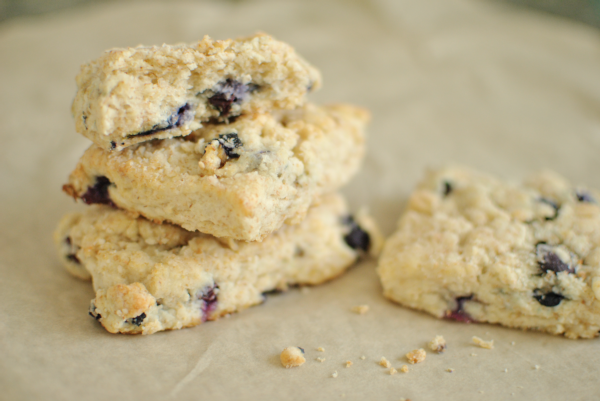How do you feel about scones? They seem like one of those foods people either love or hate. They’re buttery, light, flaky, dense, moist and dry—all at the same time. (Is that even possible?) Sconehenge Bakery makes my favorite scones, which you can buy at Whole Foods here in the Bay Area. I’ve tried three different recipes to see if I can replicate them at home. I haven’t quite found it yet, but here are the two delicious recipes I’ve tried so far…
p.s. you should know the third one’s not included because Alan said those scones were too buttery, even for him, which is saying a lot.
Recipe #1: Light + Flaky Blueberry Scones (Pictured at top)
(Adapted from The Fundamental Techniques of Classic Pastry Arts
)
This recipe produces scones with a biscuit-like texture that’s very buttery and flaky. It’s not too sweet and tastes great warm with a cup of coffee.
325 grams all-purpose flour
45 grams sugar
20 grams baking powder
Pinch of salt
110 grams chilled butter, cut into small cubes
100 grams fresh blueberries
1 large egg, at room temperature
1 large egg yolk, at room temperature
100 to 145 milliliters heavy cream
Flour for dusting
For the finish
80 milliliters heavy cream, or egg wash
Granulated sugar for sprinkling
Note: To make an egg wash, beat a whole egg and a pinch of salt together with a fork until the yolks and whites are completely combined. When refrigerated for 8 hours, the salt will break down and thin the egg whites somewhat, creating a thinner wash that’s easier to apply. Sometimes I don’t have time to wait 8 hours, and it’s always worked just fine.
Preheat the oven to 350 degrees. Line a baking sheet with parchment paper and set aside.
Combine the flour, sugar, baking powder, and salt in a large mixing bowl, stirring to blend. Add the butter and, using a pastry blender, two kitchen knives, or your fingertips, cut the butter into the dry ingredients until the mixture forms pieces the size of dried lentils. Don’t overcut or the scones will be dense instead of flaky.
Add the blueberries, tossing to combine.
Combine the egg and egg yolk in a measuring cup. Add enough cream to bring the measurement to 200 milliliters. Using a kitchen fork, lightly stir the eggs and cream to just combine.
Add the egg mixture to the dry ingredients and, using a wooden spoon, mix just until a dough forms. The dough should be quite soft and just barely come together.
Lightly flour a clean, flat work surface.
Using a bowl scraper, scrape the dough onto the floured surface. Lightly flour your hands and pat the dough out to about 3/4 inch thick.
Using a biscuit cutter, cut the dough into circles. (Alternatively, using a sharp knife, or any other shaped cutter, cut the dough into squares, triangles, or any shape you’d like.) Place the scones on the prepared baking sheet, leaving a bit of space between each one. At this point, the scones may be stored, covered and refrigerated, for up to 2 days, or frozen for up to 3 months.
Place the cream or egg wash in a small bowl.
Using a pastry brush, lightly coat the surface of each scone with the liquid. Sprinkle the tops with granulated sugar for extra color and sweetness. Bake the scones for about 15 minutes, or until lightly browned on the bottom and around the edges.
Serve them immediately, or within a few hours of being baked.
—
Recipe #2: Whole-Wheat Blueberry Ricotta Scones (Pictured second)
(Adapted from The Smitten Kitchen Cookbook
)
These scones are dense and moist and strike a perfect balance between hearty and sweet. If you like oat cookies and things like that, I think you’ll love these. They’re a bit tricky to pull together “with as few movements as possible,” and I was worried I might overwork the dough (no one likes a tough scone). I cobbled them together, but they looked a craggy awful mess, and I was positive they were going to taste it, but I was dead wrong. Now I can’t get them out of my head.
(Note: The original recipe calls for half whole-wheat flour and half all-purpose. I changed the proportion to 30:70 so I used 170 grams of whole-wheat flour and 75 grams of all-purpose.)
1 cup (120 grams) whole-wheat flour
1 cup (125 grams) all-purpose flour
1 tablespoon baking powder, preferably aluminum-free
1/4 cup (50 grams) granulated sugar
1/2 teaspoon table salt
6 tablespoons (85 grams) cold unsalted butter
1 cup (136 grams or 4 3/4 ounces) fresh blueberries
3/4 cup (189 grams) whole milk ricotta
1/3 cup (79 ml) heavy cream
Preheat oven to 425 degrees. Line a large baking sheet with parchment paper. In the bottom of a large, wide-ish bowl, whisk flours, baking powder, sugar and salt together.
With a pastry blender: Add the butter (no need to chop it first) and use the blender to both cut the butter into the flour mixture until the biggest pieces are the size of small peas. Toss in blueberries.
Without a pastry blender: Cut the butter into small pieces with a knife and work the butter into the flour mixture with your fingertips until the mixture resembles a coarse meal. Toss in blueberries.
Both methods: Add the ricotta and heavy cream together and stir them in to form a dough with a flexible spatula.Using your hands, gently knead dough into an even mass, right in the bottom of the bowl.
With as few movements as possible, transfer the dough to a well-floured counter, flour the top of the dough and pat it into a 7-inch square about 1-inch tall. With a large knife, divide the dough into 9 even squares. Transfer the scones to prepared baking sheet with a spatula. Bake the scones for about 15 minutes, until lightly golden at the edges. Cool in pan for a minute, then transfer to a cooling rack. It’s best to cool them about halfway before eating them, so they can set a bit more.
Do ahead: Scones are always best the day they are baked. However, if you wish to get a lead on them, you can make them, arrange them on your parchment-lined sheet and freeze them. If you’re prepping just one day in advance, cover the tray with plastic wrap and bake them the day you need them. If you’re preparing them more than one day in advance, once they are frozen, transfer them to a freezer bag or container. Bring them back to a parchment-lined sheet when you’re ready to bake them. No need to defrost the froze, unbaked scones, just add 2 to 3 minutes to your baking time.


I got my scone recipe from The Pioneer Woman. I like to jazz them up with cranberries!
ooh, I love her. I will have to try that one this weekend! thanks for sharing
Self-sharpening steel blades are the trick to this model's long life. http://www.bloglovin.com It's a versatile tool, suitable for cutting your beard as well as mustache. Best Beard and Mustache Trimmer It's developed to do clean as well as accurate shaving Beard Trimming Tips The trimmer is slim, lightweight, and also easy to use. Beard & Mustache Trimmers the skin smooth around the beard while cutting the beard a little. read full article It includes 5 extremely thin blades and also enhanced lubrication strips.